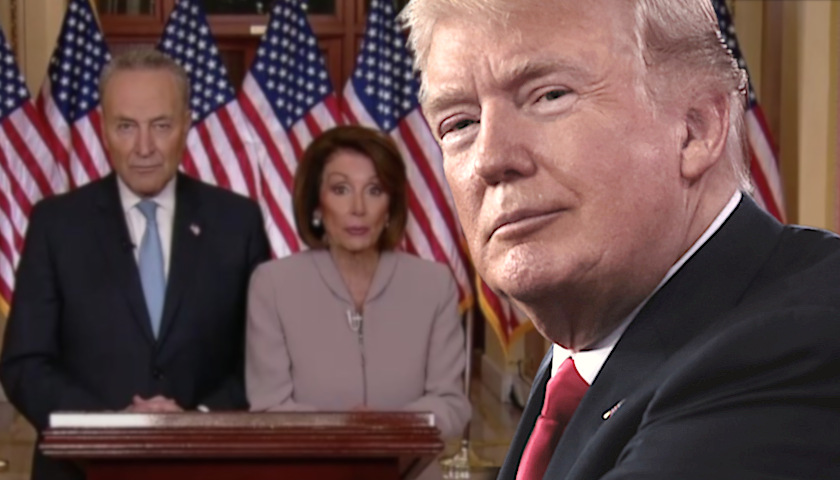by Ken Masugi
Should President Obama have been impeached for giving cash and assets worth as much as $150 billion to Iran by executive order? Or for lying about Obamacare? No, because that kind of punishment even for these injustices would have trivialized the grave constitutional purpose of impeachment and conviction. Clearly, it would have fulfilled a legitimate partisan purpose, though one which is more appropriately resolved through elections.
If the current impeachment fever materializes into reality, virtually any executive action with which the opposition party disagrees can be made an impeachable offense.
The Trump impeachment inquiry seeks to besmirch President Trump, fundraise for Democrat House and Senate candidates, destabilize the markets, knock Joe Biden out of the race, and mock presiding Chief Justice Roberts at the Senate trial. These are nothing but crude partisan appeals and clearly not constitutional purposes. Demagoguery is too gentle a word. Whatever else these political aims are, they are not affirmations of constitutional government. Once the dust settles all of these motives may well have backfired, but the Democrats have powerful enablers.
And no one serious about protesting injustice, let alone defending the Constitution, would have opened a hearing about the alleged impeachable offense with a grotesque parody of the transcript, intended to cast the president as a mobster. (Don’t the Democrats know that the Godfather portrays a hero to most to Americans? Since we’re talking parody, recall that one of the novel’s first lines can be paraphrased “for justice we must go to Don Trump.”)
Unlike Schiff’s fiction, Trump’s reality has defied the evisceration the Constitution has suffered over the decades. Normal people laughed when candidate Trump declared at a 2016 rally that Russia might help find Hillary Clinton’s 30,000 missing emails. They didn’t panic or see in it an opportunity to shiv him. In fact, Trump is the most constitutionally devout President since Lincoln.
While not shedding all the vices of Progressivism, which not even Ronald Reagan could overcome, he has challenged them in ways not seen in the Republican Party for over a century. Trump may be America’s best hope to restore the Constitution since Lincoln. That possibility calls to mind how relentlessly the Great Emancipator’s opponents, the Democrats back at that time, sought his ouster. Lawless opportunism has always united that party, whatever particular issues it advanced since 1800, whether it meant secession, dictatorial presidential power, or embrace of unelected bureaucracies, national or foreign.
Recently the incisive scholar of Russian literature, Gary Saul Morson, once again illuminated the extremism 20th century politics in his essay “Leninthink.” Lenin goes straight to the brutality demanded of the Soviet ambition: “When we are reproached with cruelty, we wonder how people can forget the most elementary Marxism.” The parallels I would make between the American and Soviet experience are instructive.
Democratic Party extremism today reflects more Lenin than Jefferson, more NKVD than New Deal, more Schiff than Solzhenitsyn. “Lenin worked by a principle of anti-empathy, and this approach was to define Soviet ethics. I know of no other society, except those modeled on the one Lenin created, where schoolchildren were taught that mercy, kindness, and pity are vices,” writes Morson. Of course the rhetoric of freedom can continue: Morson recalls “a Soviet citizen telling [him] that people in the USSR had absolute freedom of speech—so long as they did not lie.”
The fanatical environmentalism, the amoral anti-racism, the disgust with America all stem from the logic that “For a Leninist, the shoe is never on the other foot because he has no other foot.” If this doesn’t sound like all Democrats today, one must not forget that “The whole point of Leninism is that only a few people must understand what is going on.”
Fortunately, the principled answer to the Democrats’ now open Leninism—not mere socialism—is found in Trump’s recent speech to the United Nations, one filled with references to friendship and love as it articulates the need for justice within nations. In the speech are found the best responses to the Democrats’ promiscuous, partisan use of impeachment that poorly masks their Leninism—just a shadow away from violence. Trump offers, by contrast, a primer on free government and the love and justice it can offer to the world today.
The overriding theme of his speech is one familiar to students of Lincoln: the world today cannot survive half slave and half free. For the free world to survive, those nations must embrace their “national foundations,” which need revival. The world is good, and the existence of separate nations makes it so. “Looking around and all over this large, magnificent planet, the truth is plain to see: If you want freedom, take pride in your country. If you want democracy, hold on to your sovereignty. And if you want peace, love your nation.” The freedom of nations comes in many varieties, as many varieties as there are nations. The slavery the world offers, though it comes in a similar variety of means, leads always to the same end, which Trump touches on. The alternative to the nation is empire or tribalism, both of which lead to slavery. Only in nations is there strength, freedom, and civilization.
Trump starts with the need for nations to protect their borders. He speaks with the refreshing eloquence of bluntness:
Today, I have a message for those open border activists who cloak themselves in the rhetoric of social justice: …. Your policies are cruel and evil…. You put your own false sense of virtue before the lives, wellbeing, … [of] countless innocent people. When you undermine border security, you are undermining human rights and human dignity.
The suppression of individual liberties comes in myriad ways affecting the safety and happiness of women, the unborn, and homosexuals. The right of armed self-defense, so basic to the social contract, and the freedom of religion are endangered among 80 percent of the world’s people because of their governments.
As Trump elaborates, we learn that the purpose of all these rights is the safety and happiness of the people against the passion to dominate. “Our Founders gave us a system designed to restrain this dangerous impulse. They chose to entrust American power to those most invested in the fate of our nation: a proud and fiercely independent people.”
Even though a nation may be advanced in science and culture, it will face today “alarming signs and new challenges to liberty” from the most educated within. These elites constitute what John Marini calls the “administrative state”—a knowledge elite that wants to remake the nation to its current theoretical or interested liking. It is omnipresent: in television news, social media, and the bureaucracy at all levels of government.
We see evidence of this in a number of areas. A small number of social media platforms are acquiring immense power over what we can see and over what we are allowed to say. A permanent political class is openly disdainful, dismissive, and defiant of the will of the people. A faceless bureaucracy operates in secret and weakens democratic rule. Media and academic institutions push flat-out assaults on our histories, traditions, and values.
This weakening of alternatives to the administrative state rule by those imbued with the spirit of Lenin opens the way to socialism. “One of the most serious challenges our countries face is the specter of socialism. It’s the wrecker of nations and destroyer of societies.”
Socialism is another form of slavery, when understood as Abraham Lincoln summed up slavery: You work, I eat. The soul of a nation is the love of the people in it, its patriotism. Leftist-Leninists can’t love their nation because they are obsessed with dominating it, imposing their will on it. Their spiritedness is about power over others, the desire to be masters over slaves. As Trump put it, “Socialism and communism are about one thing only: power for the ruling class.”
The patriot loves the country as he or she loves their equals. That is why patriots believe in equality before the law, while Leninist leftists know only the master-slave relationship. Patriots believe the law serves the interests of the nation. Leninists believe that the law serves the interests of their favored clients. Trump summarizes, “The true good of a nation can only be pursued by those who love it: by citizens who are rooted in its history, who are nourished by its culture, committed to its values, attached to its people, and who know that its future is theirs to build or theirs to lose. Patriots see a nation and its destiny in ways no one else can.”
Therefore, Trump repeats “a message for the world that I have delivered at home: America will never be a socialist country.” That pledge means that America will always be a place for other nations to look to as a model of freedom. If Trump perseveres, it will never fully embrace the Leninism now gripping the Left.
– – –
Ken Masugi, Ph.D., is a senior fellow of the Claremont Institute. He has been a speechwriter for two cabinet members, as well as for Clarence Thomas when he was chairman of the Equal Employment Opportunity Commission. Masugi is co-author, editor, or co-editor of seven books on American politics.





